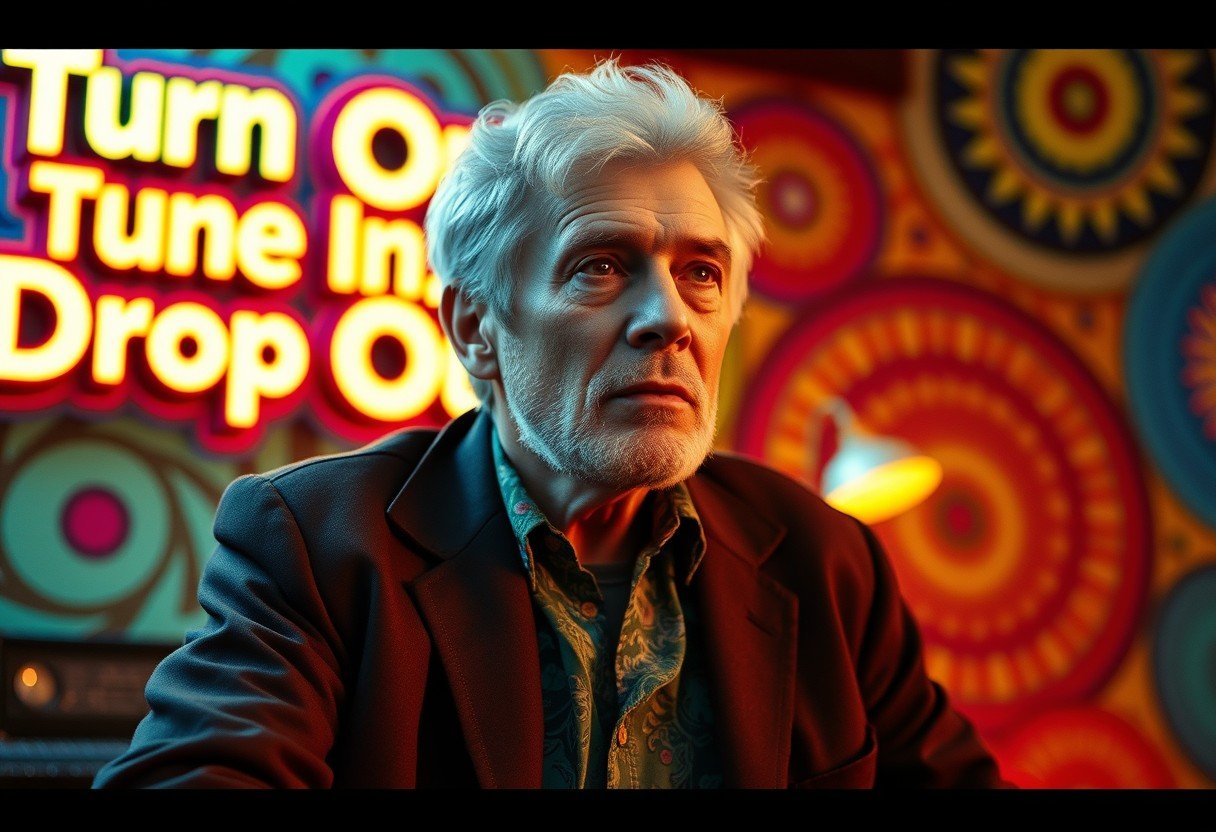The phrase “Turn on, tune in, and drop out” is one of the most famous slogans from the 1960s counterculture movement. Coined by Timothy Leary, a former Harvard psychologist turned psychedelic advocate, it became a rallying cry for a generation seeking to expand their consciousness. This slogan encapsulated a philosophy that encouraged personal discovery, questioning authority, and breaking away from mainstream societal norms through the use of substances like LSD.
Who was Timothy Leary?
Timothy Leary was an American psychologist and writer who became a leading figure in the 1960s counterculture. Initially a respected academic at Harvard University, his research into the therapeutic potential of psychedelic drugs like psilocybin and LSD set him on a different path.
He believed these substances could unlock higher states of consciousness and lead to profound personal and spiritual growth. His views put him at odds with the academic establishment and the government, leading to his dismissal from Harvard in 1963.
Leary fully embraced his role as a proponent of psychedelics, famously encouraging people to explore their own minds. He became a controversial but highly influential figure, seen by some as a visionary prophet and by others as a dangerous influence on America’s youth.
The Meaning behind “Turn on, Tune in, Drop Out”
While often misinterpreted as a simple call to take drugs and abandon society, Leary’s slogan had a deeper, more structured meaning. He intended it as a multi-step process for achieving personal liberation and enlightenment.
Breaking down the phrase reveals his true intent:
- Turn On: This meant going within to activate your neural and genetic equipment. It was about discovering the spiritual dimensions of your own consciousness, which could be achieved through psychedelics, meditation, or other means.
- Tune In: This step involved interacting harmoniously with the world around you. After turning on your inner consciousness, you were to express your new perspective and radiate it outward in your actions and life.
- Drop Out: This was perhaps the most controversial part. It meant detaching from the involuntary commitments and expectations of mainstream society. Leary advocated for a selective, graceful, and conscious withdrawal from societal pressures to pursue your own goals and lifestyle.
He saw it as a sequence for self-reliance and spiritual discovery, not an endorsement of irresponsibility. The goal was to become an individual who thinks for themselves and doesn’t blindly follow the path laid out by society.
LSD and the 1960s Counterculture Movement
To understand Leary’s slogan, you have to look at the context of the 1960s. This decade was a period of immense social change, marked by the Civil Rights Movement, protests against the Vietnam War, and a widespread rejection of traditional values.
LSD, first synthesized by Albert Hofmann in 1938, was initially studied for psychiatric purposes. However, by the 1960s, it had become a powerful symbol of the counterculture. It was embraced by artists, writers, and young people who were seeking new ways of thinking and experiencing reality.
The drug was seen as a tool for breaking down mental barriers and fostering a sense of unity, peace, and love, which were central ideals of the movement.
How Leary’s Ideas Influenced Society
Timothy Leary’s advocacy had a dramatic impact on society, especially the youth of the 1960s. His ideas inspired millions to question authority, from the government to their parents, and to explore alternative forms of spirituality and community.
This influence extended far beyond drug culture. It helped fuel new forms of art, music, and social activism that challenged the status quo. The psychedelic movement, with Leary as a key figure, encouraged a shift towards introspection and personal freedom.
The table below shows a simplified contrast between the mainstream values of the era and the counterculture ideals promoted by figures like Leary.
| Mainstream Values (1950s-60s) | Counterculture Ideals |
| Conformity and Social Order | Individualism and Personal Freedom |
| Materialism and Consumerism | Spiritual Growth and Experience |
| Respect for Authority | Questioning Authority |
The Official Reaction and Public Backlash
As the counterculture gained momentum, authorities grew increasingly alarmed. Government officials and law enforcement viewed LSD and its proponents as a serious threat to social order and public health.
This led to a significant crackdown. The media often fueled the panic with sensationalized stories of “acid casualties” and societal decay, creating a strong stigma around psychedelic users. This widespread fear campaign shaped public opinion and led to harsh legal consequences.
By the end of the 1960s, LSD was classified as a Schedule I substance in the United States, indicating it had a high potential for abuse and no accepted medical use. This designation effectively halted most scientific research into its potential therapeutic benefits for decades.
The Enduring Legacy of Leary’s Philosophy
Despite the controversy, Timothy Leary’s legacy is undeniable. He challenged conventional thinking about consciousness and mental health, and his work has had a lasting impact. His ideas about personal exploration and freedom continue to resonate in modern culture.
Today, there is a renewed interest in the therapeutic potential of psychedelics. Modern scientific studies are exploring how substances like psilocybin and LSD can treat conditions such as depression, PTSD, and anxiety. This resurgence, often called the “psychedelic renaissance,” owes a debt to the trail blazed by pioneers like Leary.
His philosophy can also be seen in contemporary wellness movements that emphasize mindfulness, meditation, and self-discovery as paths to mental well-being, proving his ideas have a place even without the use of psychedelics.
Frequently Asked Questions
Who first said “Turn on, tune in, drop out”?
The slogan was created and popularized by Dr. Timothy Leary in the mid-1960s. He first used it publicly at a press conference in New York City in 1966, and it quickly became the defining phrase of the psychedelic movement.
What did Timothy Leary mean by “drop out”?
Leary’s concept of “dropping out” did not mean becoming lazy or irresponsible. It meant making a conscious decision to detach from societal expectations and involuntary roles, like a specific career path or social status, to pursue a life of your own design.
Why was Timothy Leary considered a dangerous figure?
Authorities and critics saw Leary as dangerous because he openly encouraged the use of illegal psychedelic drugs, particularly among young people. They feared his influence would lead to widespread drug abuse, mental health crises, and a breakdown of social order.
What role did LSD play in the 1960s counterculture?
In the 1960s, LSD was more than just a drug; it was a symbol of rebellion, self-exploration, and a new way of seeing the world. It was used by many to challenge their own beliefs and was deeply intertwined with the music, art, and anti-establishment politics of the era.
Is Timothy Leary’s philosophy still relevant today?
Yes, many of his core ideas are still relevant. His emphasis on consciousness exploration, personal freedom, and questioning authority resonates in modern discussions about mental health, wellness, and the ongoing scientific research into psychedelic-assisted therapy.









Leave a Comment